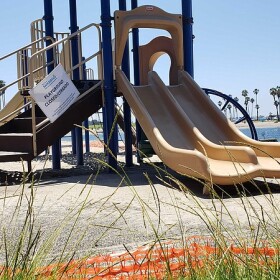When a fire threatens life and property, decisions must be made in seconds. People know they have to get away from the danger fast.
For many, that means going to an evacuation center run by the Red Cross.
“We stood up a temporary evacuation point, multiple temporary evacuation points that people could come to,” said Red Cross Southern California Regional CEO Sean Mahoney.
Evacuation points, pre-pandemic, were also temporary shelters. Think lots of cots filling school gyms. But because of the virus, that’s not possible.
Instead, evacuation points such as Steele Canyon High School and Joan MacQueen Middle School served during the Valley Fire as information centers. A place to get sheltering options. That meant arranging hotel rooms for evacuees.
“We put up 174 families, 440 people in hotels for multiple nights and then we fed them three meals a day in their hotel room,” Mahoney said.
RELATED: Valley Fire Remains At 17,665 Acres, 87% Contained
The Red Cross also got critical help from the San Diego Humane Society, which provided the Bonita animal facility to shelter evacuees’ animals; everything from birds to horses.
Situations such as that are part of the Humane Society’s mission. The same goes for schools, turning over their gyms to the Red Cross.
But hotels are not non-profit organizations. So in addition to all the extra logistical work of getting people into rooms, there’s also a significant cost.
“We try to negotiate the best rate at those 11 different hotels," Mahoney said. "We are gonna do our best to try and get some kind of reimbursement for that. But in the meantime, we have to pay for those hotel bills.”
Add to that thousands of meals, snacks and drinks, and the Red Cross is looking at thousands of dollars in expenses just for the Valley Fire.
Even now, days after the last flames were snuffed out, the expenses continue to add up.
Thirteen people are still in six hotel rooms and volunteers are still helping them; volunteers that Mahoney wanted to thank.
“They normally work 12-hour shifts. Seven at night 'til seven in the morning, and these are people who dropped what they were doing on Labor Day weekend,” Mahoney said.
That's the kind of selfless giving that gives life to the Red Cross’ mission of “always being there in times of need.”








